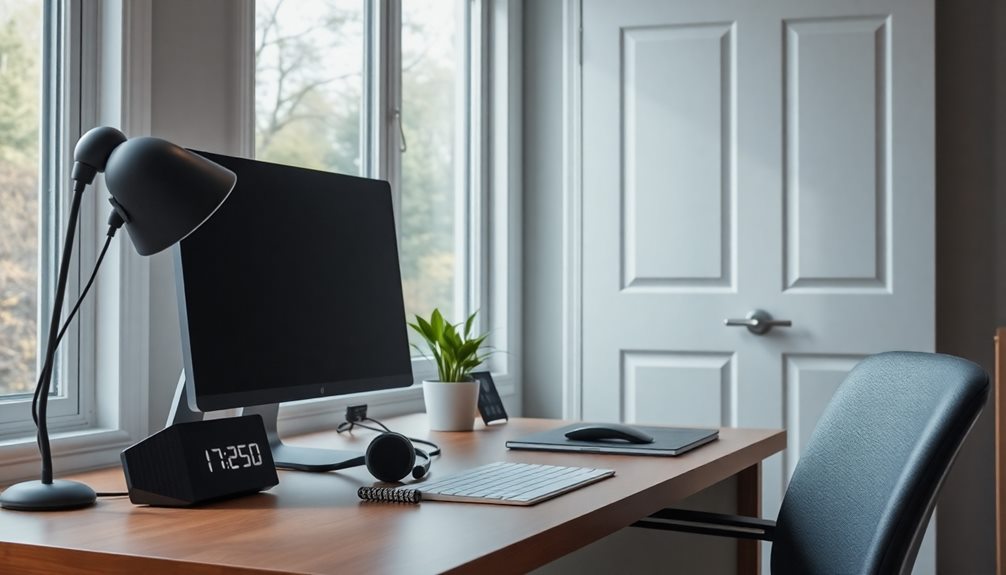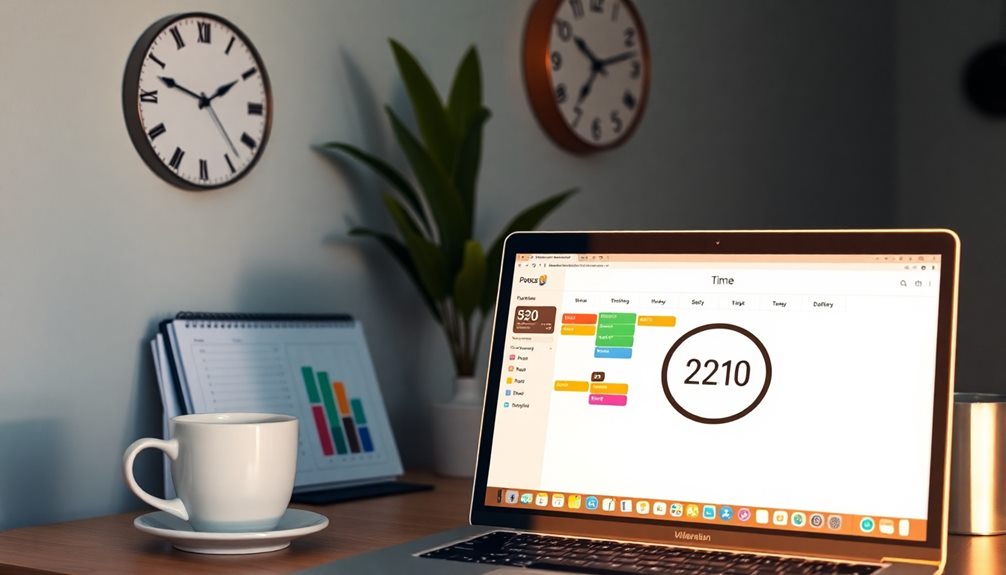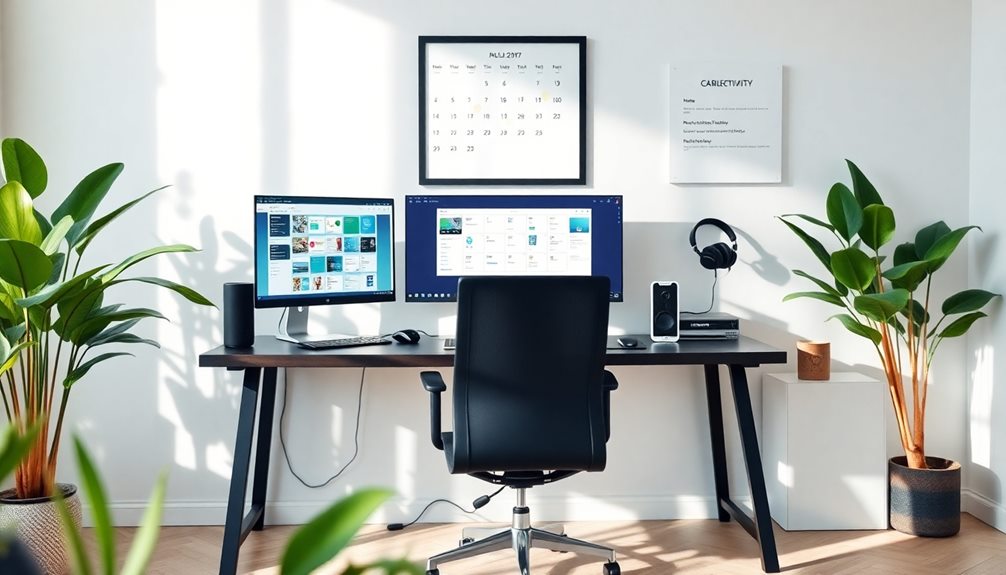To develop self-discipline as a remote worker, start by setting clear, achievable goals and breaking them into manageable tasks. Establish a consistent daily routine to foster productivity, and create a dedicated workspace free from distractions. Use tools to manage your time effectively, like the Pomodoro technique, and take regular breaks to recharge. Incorporate mindfulness practices to enhance focus and swat away distractions. Engage an accountability partner for regular check-ins, helping you stay motivated and committed. With these strategies in place, you'll build a strong foundation for success that can lead you to discover even more effective techniques.
Key Takeaways
- Establish a structured daily routine to create consistency and maintain focus throughout your work hours.
- Utilize the Pomodoro technique to enhance productivity through timed work intervals followed by short breaks.
- Set clear, achievable goals and break them into smaller tasks to track progress effectively.
- Design a distraction-free workspace to minimize interruptions and reinforce boundaries between work and personal life.
- Engage in regular check-ins with an accountability partner to stay motivated and committed to your goals.
Set Clear Goals

Setting clear goals is essential for any remote worker looking to enhance their self-discipline. When you define what you want to achieve, it becomes easier to stay focused and motivated. Consider leveraging resources from the Virtual Career Compass Community for exclusive resources that can help you outline and refine your goals.
Start by breaking your larger ambitions into smaller, manageable goals. This way, you won't feel overwhelmed, and you'll have a clearer path forward.
Goal tracking is a powerful tool that helps you monitor your progress. Consider using digital apps or simple spreadsheets to jot down your goals and the steps you need to take. Regularly reviewing your progress can boost your confidence and keep you on track. When you see how far you've come, it's a fantastic reminder of your capabilities.
Having accountability partners can also make a significant difference. Share your goals with someone you trust—be it a colleague, friend, or family member. This creates a sense of belonging and support, knowing someone else is invested in your success. Schedule check-ins with them to discuss your progress, celebrate your achievements, and troubleshoot any challenges. Their encouragement can propel you forward, especially on days when motivation feels low.
In this journey of remote work, remember you're not alone. By setting clear goals, tracking your progress, and leaning on accountability partners, you can cultivate a strong sense of self-discipline. Embrace these strategies, and watch how they transform your work experience. You've got this!
Establish a Routine

Creating a steady regimen is crucial for maintaining productivity and self-discipline as a remote worker. By establishing a daily pattern, you can set the tone for your workday and create a sense of normalcy amidst the distractions of home. Start your mornings with rituals that energize you—whether it's brewing your favorite coffee, doing some light stretching, or spending a few quiet moments in reflection. These morning rituals signal to your brain that it's time to shift into work mode.
Once your day begins, consider implementing the Pomodoro technique. This method breaks your work into focused intervals, typically 25 minutes long, followed by a short break. This not only helps you maintain concentration but also prevents burnout.
During those breaks, step away from your screen—grab a snack, take a walk, or simply breathe. You'll return to your tasks feeling refreshed and ready to tackle the next challenge.
Additionally, be flexible with your regimen. Life happens, and some days won't go as planned. Adapt your schedule when needed, but try to keep your core practices in place. By doing this, you'll develop a rhythm that makes it easier to stay disciplined and engaged.
Create a Dedicated Workspace

Design a dedicated workspace that inspires focus and productivity. This space should be your personal haven, free from distractions and conducive to deep work. Choose a quiet corner of your home, away from household noise and interruptions. By creating this designated area, you're setting personal boundaries that signal to yourself—and others—that you're in work mode.
Invest in ergonomic accessories that support your physical comfort. A good chair and desk setup can make a world of difference, helping you maintain good posture and reducing fatigue. Consider adding a standing desk converter if you prefer flexibility in your work position. Accessories like keyboard trays and monitor risers can also enhance your setup, allowing you to work efficiently while prioritizing your well-being.
Decorate your workspace with items that motivate and inspire you. Whether it's photos of loved ones, artwork, or plants, personal touches can create a sense of belonging and make the space feel uniquely yours. Keep it organized and clutter-free to foster a clear mind.
Establishing this dedicated workspace not only enhances your productivity but also reinforces the boundaries between work and personal life. When you step into this space, you're signaling that it's time to focus. By taking these steps, you'll cultivate an environment that nurtures your self-discipline, helping you thrive as a remote worker. Embrace this opportunity to create a workspace that truly reflects your goals and aspirations.
Limit Distractions

Once you've established your dedicated workspace, the next step is to tackle distractions that can easily derail your focus. In a remote setting, it's all too easy to get sidetracked by notifications, social media, or household chores. Limiting these distractions is essential for maintaining your productivity and self-discipline.
Start by setting boundaries with technology. Consider implementing a digital detox during your work hours. This means turning off unnecessary notifications and setting specific times to check your devices. You might also benefit from focus exercises, such as the Pomodoro Technique, which encourages you to work in short bursts with scheduled breaks.
Here's a simple strategy to identify and address distractions effectively:
| Distraction | Action Plan |
|---|---|
| Social Media Notifications | Silence alerts during work hours |
| Household Tasks | Make a to-do list for later |
| TV/Streaming Services | Restrict binge-watching to weekends |
| Personal Calls | Arrange calls outside of work |
| Email Overload | Review emails at designated times |
Use Time Management Techniques

Mastering time management techniques can be a game changer for remote workers aiming to enhance their productivity. When you effectively manage your time, you not only meet deadlines but also create a sense of accomplishment that fosters self-discipline.
One powerful method is the Pomodoro technique, which encourages you to work in focused bursts of 25 minutes followed by a 5-minute break. This technique helps maintain your concentration and reduces burnout, making it easier to stay motivated throughout the day.
Another effective strategy is task batching. By grouping similar tasks together, you minimize the mental load of switching between different types of work. This approach allows you to maximize your efficiency and can lead to a more structured and satisfying workday.
Remember, it's also important to incorporate energy management into your routine. Pay attention to when you feel most productive—whether it's morning, afternoon, or evening—and schedule your most demanding tasks during those peak times.
Utilize prioritization techniques to align your tasks with your goals. Creating a daily to-do list can help you focus on what truly matters, ensuring you're always working on the right tasks. When you prioritize effectively, you'll find yourself making steady progress, which builds your confidence and reinforces your self-discipline.
Embrace these time management techniques, and you'll not only enhance your productivity but also create a fulfilling work-life balance that contributes to your overall well-being. Remember, you're not alone in this journey—we're all in it together, aiming for success as remote workers.
Leverage Technology Tools

Harnessing the power of technology tools can greatly enhance your self-discipline as a remote worker. By leveraging digital organization and remote communication tools, you can create a structured environment that fosters productivity. Here are some essential tools to take into account:
| Tool Type | Purpose |
|---|---|
| Task Management Apps | Organize tasks and set priorities |
| Communication Platforms | Facilitate team collaboration |
| Digital Calendars | Schedule meetings and deadlines |
Using task management apps like Trello or Asana helps you break down projects into manageable tasks, ensuring nothing slips through the cracks. These tools allow you to visualize your workload, which can help you stay focused and motivated.
Effective remote communication tools, such as Slack or Microsoft Teams, keep you connected with your colleagues. Regular check-ins and updates foster a sense of belonging, helping you stay committed to your work goals.
Incorporating digital calendars, like Google Calendar, can streamline your day by scheduling meetings and setting reminders for important deadlines. This way, you're less likely to feel overwhelmed, and you can allocate dedicated time for each task.
Practice Mindfulness

Although working remotely can bring its own set of distractions, practicing mindfulness can greatly enhance your focus and self-discipline. By intentionally incorporating mindfulness into your daily routine, you'll find it easier to navigate the challenges of remote work while fostering a sense of belonging in your work environment.
Start with mindful breathing. Take a few moments at the beginning of your day to focus solely on your breath. Inhale deeply through your nose, hold for a moment, and then exhale slowly through your mouth. This simple practice helps clear your mind, reducing stress and centering your thoughts. Whenever you feel overwhelmed, return to this technique to regain your composure and focus.
Additionally, consider taking meditation breaks throughout your workday. These short pauses can be incredibly beneficial in recharging your mental energy. Set a timer for just five minutes, close your eyes, and immerse yourself in the present moment.
You might visualize a peaceful scene or simply observe your thoughts as they flow by without judgment. These breaks not only boost your productivity but also cultivate a deeper connection to yourself and your work.
Incorporating mindfulness into your routine creates a supportive atmosphere where you can thrive. It's a fantastic way to foster self-discipline, as you learn to recognize distractions and maintain focus.
Take Regular Breaks

Taking regular breaks is essential for maintaining your productivity and focus as a remote worker. You might feel tempted to power through your tasks, but that often leads to burnout and decreased efficiency. Instead, prioritize taking mindful breaks that allow you to recharge and refocus. These moments of productive downtime help you return to your work with renewed energy and clarity.
Here are some strategies to make the most of your breaks:
- Step Outside: Fresh air can work wonders for your mental state. A quick walk can clear your mind and spark creativity.
- Stretch or Move: Physical activity, even if it's just a few stretches, can boost your mood and energy levels. It also helps counteract the sedentary nature of remote work.
- Practice Mindfulness: Take a few minutes to meditate or focus on your breathing. This can help center your thoughts and reduce stress.
- Connect with Others: Use your break to chat with a colleague or friend. Building those connections can provide a sense of belonging and support.
Stay Accountable

Accountability plays a pivotal role in developing self-discipline as a remote worker. When you're working from home, it's easy to let distractions creep in and lose sight of your goals. That's why having someone to hold you accountable can make all the difference. Consider finding an accountability buddy—someone who understands your challenges and shares similar objectives. This partnership can create a sense of belonging and support that's invaluable in a remote work environment.
Incorporate daily check-ins with your accountability buddy. These can be quick morning chats or end-of-day reflections, whatever fits your schedules. The key is consistency. During these check-ins, share your goals for the day and discuss any obstacles you're facing. This simple practice not only keeps you focused but also fosters a deeper connection with your buddy as you navigate challenges together.
Don't underestimate the power of sharing your progress as well. When you report achievements, no matter how small, it reinforces your commitment and encourages you to keep going. Plus, your buddy can offer insights and encouragement that you mightn't find on your own.
Reflect and Adjust

After establishing accountability with your buddy, it's essential to regularly reflect on your progress and make adjustments as needed. This self-assessment is pivotal for fostering a growth mindset, allowing you to embrace the journey of continuous improvement. As you evaluate your performance, keep in mind that adaptability is key. What worked last week mightn't suit your needs this week, so stay open to change.
Here are some practical steps to guide your reflection and adjustment process:
- Set specific goals: Identify clear, achievable objectives to measure your progress effectively.
- Review regularly: Schedule time each week to assess what's working and what isn't.
- Seek feedback: Don't hesitate to ask your buddy for their perspective on your progress; they might see things you overlook.
- Be kind to yourself: Recognize that setbacks are part of growth. Treat yourself with compassion and use these experiences as learning opportunities.
Frequently Asked Questions
How Can I Stay Motivated During Long Workdays at Home?
Staying motivated during long workdays at home can be tough, but you can do it! Start by setting boundaries to create a clear work-life balance. Use effective time management techniques to break your day into manageable chunks, allowing for breaks to recharge.
Don't forget to find community; connect with others, whether through virtual meetups or social media. Building those social connections can provide encouragement and accountability, making your workdays more enjoyable and fulfilling.
What Should I Do if I Feel Isolated While Remote Working?
Picture yourself surrounded by a bustling café, laughter filling the air. When you feel isolated while working remotely, seek out that sense of community.
Look for virtual events or online groups that resonate with your interests. Connecting with others can ignite your motivation and remind you that you're not alone.
Don't hesitate to reach out for support; it's an essential step in building those connections and finding your place in the world.
How Can I Handle Interruptions From Family or Roommates?
Handling interruptions from family or roommates requires setting boundaries and clear communication. Let them know your work hours and when you need focus time. Use time management techniques, like scheduling breaks, to balance work and personal interactions.
Consider creating a designated workspace to signal when you're busy. When distractions occur, practice distraction management by gently reminding others of your commitments. This way, you foster a supportive environment while maintaining your productivity.
What Are Some Quick Self-Discipline Exercises I Can Practice?
Think of self-discipline like a muscle; the more you exercise it, the stronger it gets. Start with mindfulness breaks—pause, breathe, and refocus your energy. You'll find clarity in stillness.
Pair up with an accountability partner; share your goals and keep each other motivated. With these quick exercises, you're not just building discipline; you're creating a support system that helps you thrive.
How Do I Know if My Workspace Is Conducive to Productivity?
To figure out if your workspace's conducive to productivity, check your ergonomic setup—your chair and desk should support your body comfortably.
Pay attention to noise levels; a quiet environment boosts focus.
Make sure you're getting enough natural lighting, as it can uplift your mood.
Conclusion
In your voyage as a remote worker, think of yourself as a ship sailing through the vast sea of distractions. By setting clear goals and establishing a routine, you chart your course. Your dedicated workspace is the anchor that keeps you steady, while time management techniques are the wind in your sails. Embrace mindfulness and accountability as your guiding stars, helping you adjust your path. With each small step, you're not just working; you're mastering the art of self-discipline.
